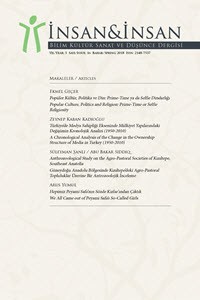Türkiye’de Medya Sahipliği Ekseninde Mülkiyet Yapılarındaki Değişimin Kronolojik Analizi (1950-2010)
Abstract
Medya sektörünün diğer sektörlerden farklı
toplumsal dışsallığı, mülkiyet yapısı ve ilişkilerini önemli kılar. Medyanın
düşünsel üretimi toplumsal rıza üretiminde ve kültürel gelişmişlik düzeyinde
belirleyicidir. Dolayısıyla toplumsal değişim süreçleri arka planında medyanın
mülkiyet yapılarındaki değişim süreçleri incelemek, bu alandaki toplumsal
çalışmalar için önemli veriler sağlayabilir. Türkiye’de medya sahipliğinin
kronolojik sürecinin ele alındığı bu çalışmada 1950’lerden 2010’lara mülkiyet
yapılarındaki değişim, farklı alanlardaki sermayenin medya alanına ilgisinin
artma süreci ve ekonomik, siyasi ve toplumsal gelişmelerle evrilen medya
sektörü ele alınmıştır. Medya sektörünün
değişim süreçlerinde, dünyada gelişen iletişim teknolojileriyle artan yatırım
maliyetleri, ülkenin ekonomik koşullarındaki ve politikalarındaki değişimler, medyanın
yaygınlığının ve dolayısıyla etki alanının genişlemesi belirleyici olmuştur.
Aynı zamanda farklı dönemlerde iktidarların medya ile kurduğu ilişkiler,
yönlendirmeler de medya sektörünün kompozisyonunda belirleyicidir. Çalışmanın
sınırlandığı dönemler içinde medya sahipliğindeki değişimler kronolojik dizin
halinde derlenmiş ve farklı çalışmalara da referans olabilecek bir takip
sistemi amaçlanmıştır.
References
- Kaynakçaİnuğur,Nuri , Türk Basın Tarihi, Gazeteciler Cemiyeti, İstanbul 1992
- Ateş, Toktamış, Osmanlıdan Günümüze Türk Finans Tarihi, İstanbul 1999
- Sözeri, Ceren, Türkiye’de Medya İktidar İlişkileri, İstanbul Enstitüsü Yayınları, İstanbul 2015
- Kaya, Raşit, İktidar Yumağı: Medya Sermaye Devlet,İmge Kitabevi, İstanbul 2009
- Özsever, Atilla ,Tekelci Medyada Örgütsüz Gazeteci, İmge Yayınevi, 2004
- Adaklı, Gülseren, Türkiye’de Medya Endüstrisi, Ütopya Yayınları,2006
- Sönmez, Mustafa, Filler ve Çimenler, İletişim Yayınevi 2003
- Oktay, Ahmet, Toplumsal Değişme ve Basın 1960-1986 Türk Basını üzerine Uygulamalı Bir Çalışma, BFS Yayınları, İstanbul, 1987
- Taşdemir,Erdem, “1980 Sonrası Türk Basını, Türk Siyasi Hayatı ve Basın-Siyaset İlişkisi”, Selçuk Üniversitesi İletişim Dergisi, Konya 2005
- Kadıoğlu, Zeynep, “Promosyonlar”, Hediye Kitabı, Kitabevi, İstanbul 2007
- Sarıgedik, İlknur, “1994 – 2001 Krizlerine genel Bakış ve Kriz Yönetimi”, Ankara Üniversitesi SBE, Tezsiz Yüksek Lisans Projesi, 2008
- Bulunmaz, Barış, “Basın İşletmelerinin Finansal Yapısı ve 2001 Krizi Öncesi ve Sonrası Reklam Gelirlerinin Analizi”, Maliye ve Finans Yazıları Dergisi, Sayı 46, Ocak 2010
- Adaklı, Gülseren, “Türk Basınından Türk Medyasına Hakim Grupların Kısa Tarihi”, www.sendika.org, 2010 (Erişim 21.12.2011)Demir, Sevtap, “Türkiye’de 2001 Yılı Sonrasında Medya İktidar İlişkileri ve Gazeteci Pratiklerine Yansıması”, Ankara Üniversitesi SBE; Yüksek Lisans Tezi, 2013
- Söylemez, Ayça, “Sendikadan Çıkarılan İşçilere Birleşme Çağrısı”, www.bianet.org, (Erişim Tarihi Şubat 2018)
Abstract
Apart
from other sectors, social externality of the media industry makes the property
of media structure and relations important. The intellectual production of the
media is decisive in the construction of social consent and the level of
cultural development. In the light of the social dynamics, considering the
change in the ownership structure of the media provides important information
for social studies in this field. This study deals with the chronological
course of the media ownership from 1950 to 2010 in Turkey, and discusses other
sectors’ increasing interest in the media capital. The acceleration of the
investment costs due to emerging new communication technologies in the world
and the changes in the economic conditions and policies of the country have
played an influential role in the radical changes. Hence, established relations
between governments and media in various periods have profoundly affected the
composition of the media. By compiling the changes in media ownership
chronologically, the paper meanwhile aims to provide a reference point for
other studies.
Keywords
References
- Kaynakçaİnuğur,Nuri , Türk Basın Tarihi, Gazeteciler Cemiyeti, İstanbul 1992
- Ateş, Toktamış, Osmanlıdan Günümüze Türk Finans Tarihi, İstanbul 1999
- Sözeri, Ceren, Türkiye’de Medya İktidar İlişkileri, İstanbul Enstitüsü Yayınları, İstanbul 2015
- Kaya, Raşit, İktidar Yumağı: Medya Sermaye Devlet,İmge Kitabevi, İstanbul 2009
- Özsever, Atilla ,Tekelci Medyada Örgütsüz Gazeteci, İmge Yayınevi, 2004
- Adaklı, Gülseren, Türkiye’de Medya Endüstrisi, Ütopya Yayınları,2006
- Sönmez, Mustafa, Filler ve Çimenler, İletişim Yayınevi 2003
- Oktay, Ahmet, Toplumsal Değişme ve Basın 1960-1986 Türk Basını üzerine Uygulamalı Bir Çalışma, BFS Yayınları, İstanbul, 1987
- Taşdemir,Erdem, “1980 Sonrası Türk Basını, Türk Siyasi Hayatı ve Basın-Siyaset İlişkisi”, Selçuk Üniversitesi İletişim Dergisi, Konya 2005
- Kadıoğlu, Zeynep, “Promosyonlar”, Hediye Kitabı, Kitabevi, İstanbul 2007
- Sarıgedik, İlknur, “1994 – 2001 Krizlerine genel Bakış ve Kriz Yönetimi”, Ankara Üniversitesi SBE, Tezsiz Yüksek Lisans Projesi, 2008
- Bulunmaz, Barış, “Basın İşletmelerinin Finansal Yapısı ve 2001 Krizi Öncesi ve Sonrası Reklam Gelirlerinin Analizi”, Maliye ve Finans Yazıları Dergisi, Sayı 46, Ocak 2010
- Adaklı, Gülseren, “Türk Basınından Türk Medyasına Hakim Grupların Kısa Tarihi”, www.sendika.org, 2010 (Erişim 21.12.2011)Demir, Sevtap, “Türkiye’de 2001 Yılı Sonrasında Medya İktidar İlişkileri ve Gazeteci Pratiklerine Yansıması”, Ankara Üniversitesi SBE; Yüksek Lisans Tezi, 2013
- Söylemez, Ayça, “Sendikadan Çıkarılan İşçilere Birleşme Çağrısı”, www.bianet.org, (Erişim Tarihi Şubat 2018)
Details
| Primary Language | Turkish |
|---|---|
| Journal Section | Articles |
| Authors | |
| Publication Date | May 2, 2018 |
| Published in Issue | Year 2018 Volume: 5 Issue: 16 |

